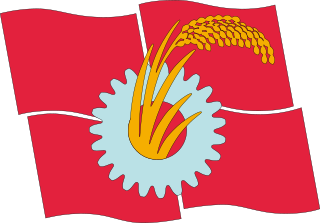Related Research Articles

Tetsu Katayama was a Japanese politician who was Prime Minister of Japan from 1947 to 1948. A Christian pacifist, he bears the distinction of having been the first socialist to serve as Prime Minister of Japan. He was a Christian socialist.

The Democratic Party of Japan was a centrist to centre-left liberal or social-liberal political party in Japan from 1998 to 2016.

The Japanese Communist Party is a communist political party in Japan. With approximately 270,000 members belonging to 18,000 branches, it is one of the largest non-governing communist parties in the world.

The Social Democratic Party is a political party in Japan that was established in 1996. Since its reformation and name change in 1996, it has advocated pacifism and defined itself as a social-democratic party. It was previously known as the Japan Socialist Party.

Mizuho Fukushima is a Japanese politician, attorney. A native of Nobeoka, Miyazaki, she has been a member of the House of Councillors since 1998, was re-elected in 2004 and 2010, and was the head of the Social Democratic Party of Japan (SDP), from 2003 to 2013. She was elected as the leader of the party for a second time in February 2020.
Social liberalism, also known as new liberalism in the United Kingdom, modern liberalism in the United States where it is known as liberalism, left-liberalism in Germany, and progressive liberalism in Spanish-speaking countries, is a political philosophy and variety of liberalism that endorses social justice and the expansion of civil and political rights. It is economically based on the social market economy and views the common good as harmonious with the individual's freedom. Social liberals overlap with social democrats in accepting economic intervention more than other liberals; its importance is considered auxiliary compared to social democrats. Ideologies that emphasize its economic policy include welfare liberalism, New Deal liberalism in the United States, and Keynesian liberalism. Cultural liberalism is an ideology that highlights its cultural aspects. The world has widely adopted social liberal policies.

The National Union was the sole legal party of the Estado Novo regime in Portugal, founded in July 1930 and dominated by António de Oliveira Salazar during most of its existence.

The Democratic Party of the Left was a democratic-socialist and social-democratic political party in Italy. Founded in February 1991 as the post-communist evolution of the Italian Communist Party, the party was the largest in the Alliance of Progressives and The Olive Tree coalitions. In February 1998, the party merged with minor parties to form Democrats of the Left. At its peak in 1991, the party had a membership of 989,708; by 1998, it was reduced to 613,412.
Conservative liberalism or right-liberalism is a variant of liberalism, combining liberal values and policies with conservative stances, or simply representing the right-wing of the liberal movement. In the case of modern "conservative liberalism", scholars sometimes see it as a more positive and less radical variant of classical liberalism, but it is also referred to as an individual tradition that distinguishes it from classical liberalism and social liberalism. Conservative liberal parties tend to combine economically liberal policies with more traditional stances and personal beliefs on social and ethical issues.

House of Councillors elections were held in Japan on 29 July 2001. They were the first national elections since Junichiro Koizumi became Prime Minister after Yoshiro Mori resigned in April 2001. The Liberal Democratic Party (LDP) and its election allies, were the major winner, provided Koizumi a strong mandates to move forward with his reform policies. The ruling coalition performed well, and regain their majority in the House of Councillors.

The Democratic Front of Albania was the largest mass organization of the Party of Labour of Albania, which united all other mass organizations of the Party within it. The party was responsible for carrying out the Party's cultural and social programs to the masses, and was in charge of nominating candidates in elections.
Progressivism holds that it is possible to improve human societies through political action. As a political movement, progressivism seeks to advance the human condition through social reform based on purported advancements in science, technology, economic development, and social organization. Adherents hold that progressivism has universal application and endeavor to spread this idea to human societies everywhere. Progressivism arose during the Age of Enlightenment out of the belief that civility in Europe was improving due to the application of new empirical knowledge to the governance of society.

The Japan Labour-Farmer Party was a socialist political party in Japan between December 1926 and December 1928. During its existence, it occupied a centrist position in the divided socialist movement.

The Labour-Farmer Party was a political party in the Empire of Japan. It represented the left-wing sector of the legal proletarian movement at the time. Oyama Ikuo was the chairman of the party. At the time the party was banned by the government in 1928, it was estimated to have around 90,000 members in 131 local organizations. The party was supported by the Hyōgikai trade union federation and the Japan Peasant Union.
The Proletarian Masses Party was a short-lived political party in Japan. It was founded on July 22, 1928 by the Rōnō faction. Suzuki Mosaburō became the general secretary of the party. Yamakawa and Sakai Toshihiko functioned as 'elder' advisors in the party. Other prominent founders of the party were Kuroda, Inamura Junzo and Okada.
The Japan Farmers Party was a political party in Japan between 1926 and 1928. It represented a rightist tendency amongst the proletarian parties in the country at the time. The party had a nationalist orientation.
The Social Democratic Party was a political party in Japan between 1926 and 1932. Amongst the three main proletarian parties in Japan at the time, the Social Democratic Party occupied a rightist position.
The Labour-Farmer Masses Party was a political party in Japan. It was founded in January 1929 by Mizutani Chozaburo, a former associate of the Labour-Farmer Party leader Oyama Ikuo. Mizutani criticized Oyama Ikuo for being too open towards a merger with the centrist sectors of the socialist movement. The Labour-Farmer Masses Party was largely confined to Kyoto. The party was one of the founders of the United Proletarian Party Front in 1929.
The proletarian parties were a group of left-wing political parties in Japan. Several proletarian parties were launched after enactment of the Universal Manhood Suffrage Act in 1925.
References
- ↑ Large, Stephen S. Showa Japan: Political, Economic and Social History 1926-1989 . London: Routledge, 1998. p. 122
- ↑ Beckmann, George M., and Genji Okubo. The Japanese Communist Party 1922-1945 . Stanford, Calif: Stanford University Press, 1969. p. 221